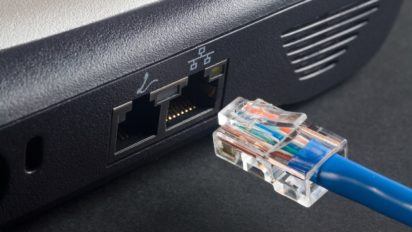Slow internet can have many causes, but if your internet has gotten progressively slower over time, there might be a less obvious culprit right in your own home. If you haven’t made any changes to your internet plan and can’t figure out any other reason that your internet connection is slowing down, we may have the answer you’ve been looking for.
However, keep in mind that other changes in your internet usage could also affect your home’s internet speed. For example, check to see if you’ve recently made any of the following adjustments to your home, as these could also affect your Wi-Fi connection.
- Added more devices to your home Wi-Fi network, such as smart home devices
- Moved your modem or router to a different location in your home
- Let your antivirus software on any of your devices expire
- Haven’t rebooted your modem and router in a long time
Why an overheated computer is your worst enemy
An overheated device can be a safety concern as well as a real drag when it comes to getting anything done online. You may be on your computer for longer stretches of time than ever before, especially if you are new to working from home, or teaching remotely. This extra time spent logged in can lead to your laptop overheating, even if you’ve never had that problem in the past.
Other things that can cause your computer to overheat include:
- The age of your computer. Older computers may be more apt to heat malfunctions.
- The location of your computer and computer accessories. You might want to rethink your location if you have your computer in front of a sunny window or are working outside for long periods of time.
- Dusty spaces and blocked ventilation on your device. Can’t remember the last time you wiped down your computer? A buildup of dust could be inhibiting your device’s cooling vents. Similarly, if your computer’s built-in vent is obstructed by other objects, like a cluttered desk, overheating can be an issue.
How to tell if your computer is overheating
Besides burning the top of your legs, an overheated laptop can have several lasting negative effects that you will want to avoid. The first sign of trouble could be a lagging operating system, but the long-term internal damage could lead to a total computer shutdown.
Keep an eye out for these warning signs of an overheating laptop:
- A device that is unusually hot to the touch.
- The screen is repeatedly freezing.
- Extra amounts of lag and buffering when online.
- Your computer re-starts or shuts off for no apparent reason.
How to fix your overheated computer
The best way to fix an overheated laptop is to put some measures in place to prevent it. Keep your internet running at top speeds and your computer functioning at its highest capacity by maintaining your device with these simple steps.
Here are some easy and cheap tips to keep your computer cool year-round:
- Clean the fan or vents. Gently spray any exposed vents with compressed air two to four times a year to keep your device dust-free.
- Refer to your computer’s manual. Find model-specific instructions on how to maintain your device. Lost the paper copy? Try going to your manufacturer’s website and searching by product name and model number (this information is usually printed on an external part of your computer).
- Take breaks. If you’re participating in data-intensive online activities, such as gaming or streaming, try taking a break every few hours to give your device — and yourself — a chance to cool off. It’s also a good idea to charge your laptop during one of these downtimes, since charging the device while in use will increase its overall temperature.
- Make sure your computer is in a ventilated area. Keep your device away from areas that are heavily impacted by extreme sunlight, heat from indoor lighting or radiant heat from other devices.
- Use an external cooling pad or fan. Keeping your computer cool is especially important if your internal fan has stopped working or isn’t working at full capacity. Another benefit of a cooling pad is that they are often slightly elevated for improved ergonomics and are typically powered by a USB port that plugs directly into your device — no additional outlets or batteries needed.
What if my computer has already overheated?
In the unfortunate event that your computer has already overheated, there are still some restorative actions that you can take. First, if you think your computer has overheated, immediately stop using it and unplug it. It may be a good idea to turn off the computer entirely if possible.
Next, make sure to take the preventative measures above to avoid any further damage, such as removing the device from any heat sources and dusting external vents if necessary.
Finally, if you notice that your computer has encountered lasting effects from overheating, such as ongoing processing errors or continuing system glitches, consult a qualified computer repair technician to get your computer running safely, and quickly, again. Not sure where to find a tech? Try Angie’s List or Thumbtack to locate repair shops in your area.
Find other ways to get the most out of your internet connection and home devices by following our Resource Center.
Written by:
Lisa IscrupeWriter, Broadband & Data Content
Lisa uses years of experience in sales and customer service for internet-TV providers to inform her writing on broadband. Her work has been referenced by CNN and other national sources.
In Lisa’s Words: Ever…
Read more
Edited by:
Robin LaytonEditor, Broadband Content
-
Featured
![13 best Wi-Fi analyzers to boost your network speeds]() 13 best Wi-Fi analyzers to boost your network speeds Alex Sheehan — 5 min read
13 best Wi-Fi analyzers to boost your network speeds Alex Sheehan — 5 min read -
Featured
![Ethernet cable speed categories explained]() Ethernet cable speed categories explained Camryn Smith — 5 min read
Ethernet cable speed categories explained Camryn Smith — 5 min read -
Featured
![18 tips to improve your internet connection and boost Wi-Fi signal]() 18 tips to improve your internet connection and boost Wi-Fi signal Camryn Smith — 9 min read
18 tips to improve your internet connection and boost Wi-Fi signal Camryn Smith — 9 min read
Latest
-
Thursday, July 25, 2024
Worried about losing your signal? This is how to keep your satellite dish cleanDavid Anders — 6 min read
-
Tuesday, July 23, 2024
The best free TV and movie streaming services 2024Camryn Smith — 5 min read
-
Tuesday, July 23, 2024
Everything you need to know about internet speedsRobin Layton — 8 min read





